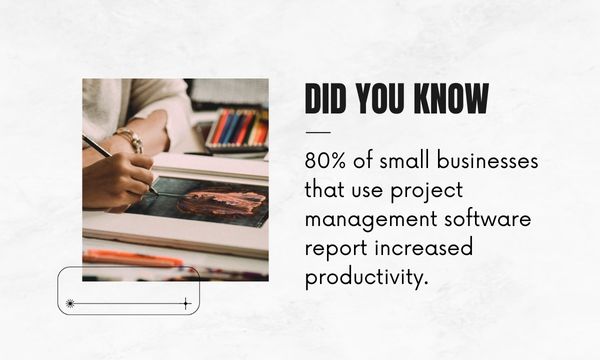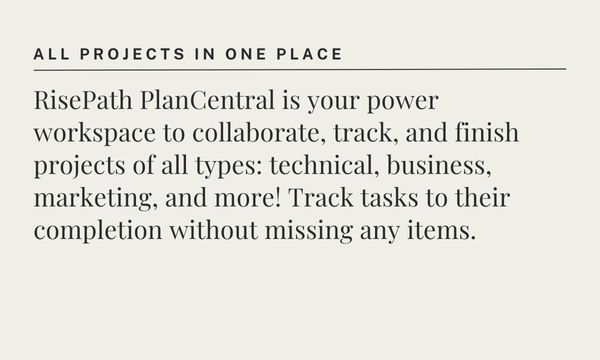Project management is a critical aspect of running a successful small business. Whether you are a startup or an established company, having the right tools to manage your projects efficiently can make a significant difference in your productivity and overall success. This is where small business project management software comes into play. In this article, we will explore the importance of choosing the best project management software for your small business and how it can unlock efficiency in your operations.
Before diving into the world of project management software, it is essential to understand the unique needs of your small. business Every business has its own set of requirements, goals, and challenges. By identifying these factors, you can narrow down your options and choose a software solution that aligns with your specific needs. Whether you need a tool for task management, collaboration, resource allocation, or budget tracking, understanding your requirements will help you make an informed decision.
Implementing the right project management software can bring numerous benefits to your small business. Firstly, it provides a centralized platform for all your project-related activities, allowing you to streamline communication and collaboration among team members. This can lead to improved coordination, increased productivity, and better project outcomes. Additionally, project management software often comes with features like task tracking, progress monitoring, and reporting, enabling you to stay on top of your projects and make data-driven decisions.
Also Read: Project Management Tutorial for Beginners
When selecting project management software for your small business, there are several factors to consider. Firstly, evaluate the scalability of the software. As your business grows, you want a solution that can accommodate your expanding needs. Secondly, consider the user-friendliness of the software. It should be intuitive and easy to navigate, ensuring that your team can quickly adopt and utilize it effectively. Other factors to consider include cost, integration capabilities with existing tools, customer support, and security features.
The Importance of Choosing the Best Project Management Software
Choosing the best project management software is of utmost importance for small businesses. It can significantly impact the efficiency and success of their projects. With the right software in place, businesses can streamline their project management processes, improve collaboration among team members, and enhance overall productivity. The software acts as a central hub where all project-related information, tasks, and deadlines are organized and easily accessible. This ensures that everyone involved in the project is on the same page and can work together seamlessly.
Additionally, the best project management software offers a range of features and functionalities that can help small businesses effectively plan, track, and monitor their projects. These features may include task management, scheduling, resource allocation, budgeting, and reporting capabilities. By utilizing these tools, businesses can better allocate their resources, identify potential bottlenecks or issues early on, and make data-driven decisions to keep their projects on track. This level of control and visibility is crucial for small businesses to deliver projects successfully and meet client expectations.
Furthermore, choosing the right project management software can also have a positive impact on communication and collaboration within the team. The software provides a centralized platform where team members can easily communicate, share files, and collaborate on tasks. This eliminates the need for lengthy email threads or scattered information across different platforms, leading to improved efficiency and reduced miscommunication. Effective collaboration is essential for small businesses, as it fosters teamwork, enhances productivity, and ensures that everyone is working towards the same goals.
In summary, the importance of choosing the best project management software for small businesses cannot be overstated. It enables businesses to streamline their project management processes, improve collaboration, and enhance overall productivity. By utilizing the right software, small businesses can effectively plan, track, and monitor their projects, allocate resources efficiently, and make data-driven decisions. Additionally, the software facilitates seamless communication and collaboration among team members, leading to improved efficiency and successful project delivery. Investing in the best project management software is a wise decision for small businesses looking to unlock their full potential and achieve their project goals.
Choosing the Right Project Management Software for Your Small Business Needs
Choosing the right project management software for your small business needs can be a daunting task. With so many options available in the market, it’s important to consider several factors before making a decision. One of the first things to consider is the size and complexity of your projects. If you have a small team and simple projects, you may not need a robust software with advanced features. On the other hand, if you have a larger team and complex projects with multiple dependencies, you’ll need a software that can handle these requirements. Assessing the specific needs of your business will help you narrow down your options and choose a software that aligns with your project management goals.
Another important factor to consider is the scalability of the software. As your small business grows, your project management needs may also evolve. It’s essential to choose a software that can grow with your business and accommodate increasing project demands. Look for software that offers flexible pricing plans and the ability to add or remove users easily. Scalability ensures that you won’t outgrow your project management software too quickly and helps you avoid the hassle of switching to a new system in the future.
Integration capabilities are also crucial when choosing project management software for your small business. Consider the other tools and software your team uses on a daily basis, such as communication tools, file sharing platforms, or time tracking software. Look for project management software that integrates seamlessly with these existing tools. Integration eliminates the need for manual data entry and allows for a more streamlined workflow. It also ensures that all your project-related information is centralized in one place, making it easier for your team to collaborate and access relevant data.
Lastly, don’t forget to consider the user interface and ease of use. Project management software should simplify your work, not complicate it further. Look for software that has an intuitive and user-friendly interface, with features that are easy to navigate and understand. Consider the learning curve for your team and choose software that offers adequate training and support resources. A software that is easy to use will increase adoption rates among your team members and lead to higher productivity.
In conclusion, choosing the right project management software for your small business requires careful consideration of factors such as project size and complexity, scalability, integration capabilities, and user interface. By assessing your specific needs and evaluating different software options based on factors these, you can make an informed decision that will enhance your project management efficiency and contribute to the overall success of your small business.
Essential Features in Small Business Project Management Software
When choosing project management software for your small business, there are several essential features that you should look for. One important feature is task management. The software should allow you to create and assign tasks to team members, set deadlines, and track progress. This will help you stay organized and ensure that everyone knows what they need to do and when it needs to be done.
Another crucial feature is collaboration tools. Small businesses often have remote or distributed teams, so it’s important to have software that facilitates communication and collaboration. Look for features like real-time messaging, file sharing, and the ability to comment on tasks or projects. This will help your team stay connected and work together effectively.
Integration capabilities are also important when choosing project management software. Your small business likely uses other tools and software for different purposes, such as accounting or customer relationship management. Look for project management software that integrates with these existing tools, as it will streamline your workflow and eliminate the need for manual data entry or switching between multiple platforms.
Reporting and analytics features are another key aspect to consider. As a small business owner, you need to have visibility into the progress and performance of your projects. Look for software that provides customizable reports and analytics dashboards, so you can track key metrics, identify bottlenecks, and make data-driven decisions to improve efficiency.
Lastly, consider the scalability and flexibility of the project management software. Your small business may grow and evolve over time, so it’s important to choose software that can accommodate your changing needs. Look for software that allows you to add or remove users easily, customize workflows, and adapt to new project requirements. This will ensure that your project management software can grow with your business.
Is it easy to learn and use project management software for small businesses?
Yes, project management software for small businesses is designed to be easy to learn and use. RisePath offer user-friendly interfaces and intuitive navigation, making it simple for small business owners and team members to get started. RisePath also provide step-by-step guides, tutorials, and customer support to help users become familiar with the software’s features and functionality. With a little time and practice, small business owners can quickly become proficient in using project management software to streamline their operations and improve efficiency.
For example, RisePath’s project management software platforms offer drag-and-drop functionality, allowing users to easily create and update project tasks and timelines. This intuitive feature eliminates the need for complex coding or technical skills, making it accessible to users of all levels of technical expertise. Additionally, RisePath provide customizable templates and pre-built workflows, enabling small business owners to quickly set up projects and start managing their tasks without the need for extensive training or experience.
Also Read: Transforming Small Business CRM Operations
Furthermore, project management software often includes collaborative features that make it easy for team members to communicate and collaborate on projects. These features can include real-time messaging, file sharing, and task assignment capabilities. By providing a centralized platform for communication and collaboration, project management software helps small businesses streamline their workflows and improve team productivity.
Overall, while there may be a learning curve involved in initially setting up and familiarizing oneself with project management software, the RisePath’s tools available for small businesses are designed to be user-friendly and intuitive. With the right software choice and a little practice, small business owners can easily learn and use our project management software to effectively manage their projects and drive efficiency.
What are some common challenges faced by small businesses when implementing project management software
One common challenge faced by small businesses when implementing project management software is the resistance to change. Employees may be accustomed to their existing methods and may resist adopting new software. This resistance can stem from a fear of the unknown, a lack of understanding of the benefits, or concerns about the learning curve. Overcoming this challenge requires effective change management strategies, such as clear communication, training programs, and demonstrating the value of the software to employees.
Another challenge is the selection of the right software that aligns with the specific needs of the business. With numerous project management software options available, it can be overwhelming for small businesses to choose the most suitable one. Factors to consider include the size and complexity of projects, desired features, scalability, ease of use, and cost. Small businesses should carefully evaluate their requirements and conduct thorough research to find a software solution that meets their needs and budget.
Integration with existing systems and tools is also a common challenge. Small businesses often have multiple software applications and tools in place, such as accounting software, CRM systems, or communication tools. Ensuring seamless integration between project management software and these existing systems can be complex and time-consuming. It requires careful planning, compatibility checks, and sometimes custom development or third-party integrations. Overcoming this challenge is crucial to avoid data duplication, improve efficiency, and streamline workflows.
Conclusion
In conclusion, choosing the right project management software for your small business is crucial for unlocking efficiency and maximizing productivity. By considering factors such as your business’s specific needs, budget, and team size, you can make an informed decision that aligns with your goals and objectives. It is important to evaluate the features and functionalities offered by different software options, ensuring they cater to your project management requirements. Additionally, consider the scalability and flexibility of the software to accommodate your business’s growth in the future. By investing time in researching and selecting the best project management software, you can streamline your processes, improve collaboration, and ultimately drive success for your small business.
Furthermore, when choosing project management software, it is essential to take into account the ease of use and user interface. Opting for a software with an intuitive and user-friendly interface can significantly enhance adoption and reduce the learning curve for your team. This can lead to quicker implementation and increased efficiency in managing projects. Additionally, consider the availability of training and support resources provided by the software vendor, as this can greatly assist your team in utilizing the software to its full potential.
Moreover, don’t overlook the importance of integration capabilities when selecting project management software. Ensure that the software can seamlessly integrate with other tools and systems your business relies on, such as communication platforms, document management systems, or accounting software. This integration can eliminate manual data entry, improve data accuracy, and enhance overall workflow efficiency. It is also beneficial to consider the software’s compatibility with different devices and operating systems, allowing your team to access and collaborate on projects from various devices and locations.




Comments are closed, but trackbacks and pingbacks are open.